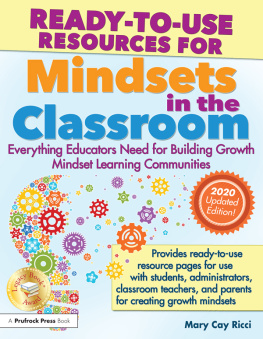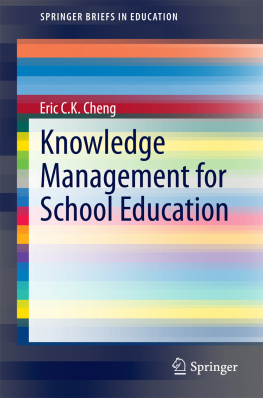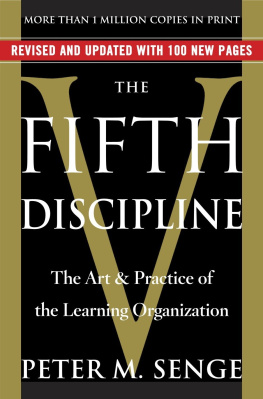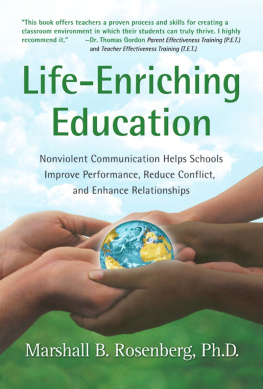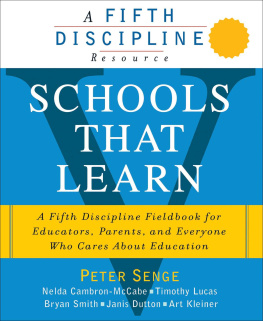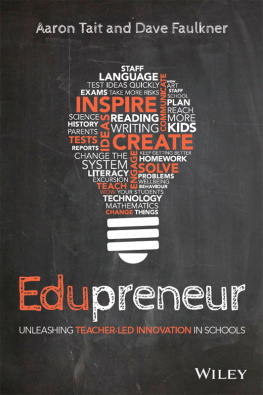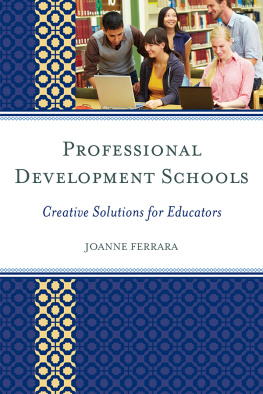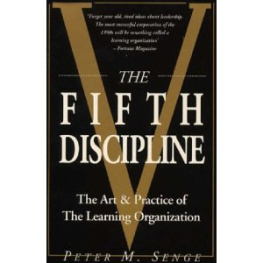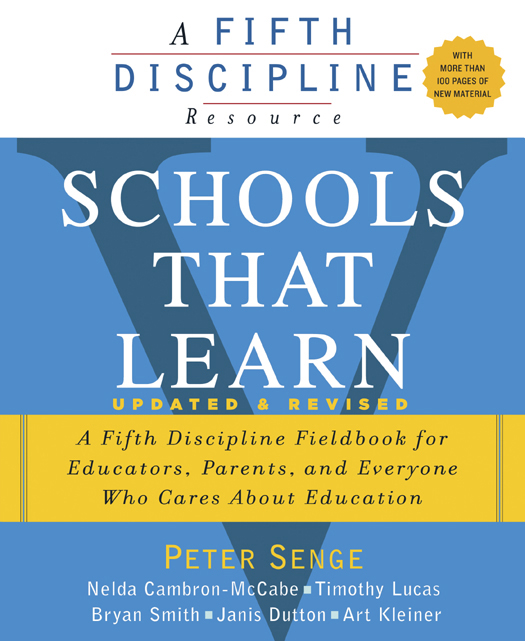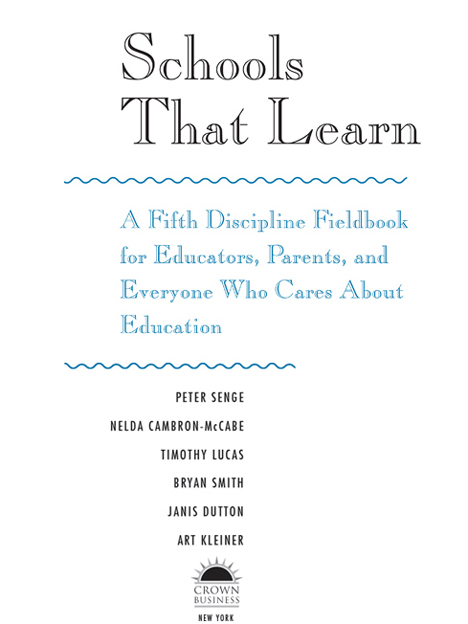Copyright 2012 by Peter Senge, Nelda Cambron-McCabe, Timothy Lucas, Bryan Smith, Janis Dutton, Art Kleiner
All rights reserved.
Published in the United States by Crown Business, an imprint of the Crown Publishing Group, a division of Random House, Inc., New York. www.crownpublishing.com
Originally published in hardcover in slightly different form in the United States by Doubleday, a division of Random House, Inc., New York, in 2000.
CROWN BUSINESS is a trademark and CROWN and the Rising Sun colophon are registered trademarks of Random House, Inc.
Library of Congress Cataloging-in-Publication Data is available upon request.
eISBN: 978-0-385-52186-4
Cover design by Jean Traina
v3.1
6 The Industrial Age System of Education
Peter Senge
7 Are You Smarter Than a Thermostat?
Nelda Cambron-McCabe, Janis Dutton
2 Designing a Learning Classroom
Nelda Cambron-McCabe
3 Legal, Safe, and Something You Want to Learn
Carol Ann Kenerson
1 The Dignity of the Child
Tim Lucas
2 Revealing the Learner
Tim Lucas
3 Overcoming Absurdity
Terry OConnor, Deirdre Bangham
4 We Dance Together
Candee Basford
5 What Signals Are You Sending?
Janis Dutton, Nelda Cambron-McCabe, Tim Lucas, Art Kleiner
1 Teaching Structural Tension
Robert Fritz
2 A Shared Vision Process for the Classroom
Tim Lucas
3 Homework: The Beast
Betty Quantz
4 Assessment as Learning
Bena Kallick
5 Assessment and Accountability
Steve Price
6 Intelligent Behaviors
Art Costa
7 Knowledge and Power
Nelda Cambron-McCabe, Janis Dutton
1 Check-In
Carol Kenerson, Micah Fierstein, Janis Dutton
2 Opening Day
Nelda Cambron-McCabe
3 Reframing the Parent-Teacher Conference
Nelda Cambron-McCabe, Janis Dutton, Tim Lucas, Betty Quantz, Art Kleiner
4 Dont eat the pizza
Bryan Smith, Nelda Cambron-McCabe, Tim Lucas, Art Kleiner, Janis Dutton
1 Systems Study for the Long Term
Jay W. Forrester
2 A Guide to Practice for Systems Thinking in the Classroom
Assembled and edited by Lees Stuntz and Nina Kruschwitz
3 Context and Engagement
Peter Senge
4 Pitfalls and Skills
Michael Goodman
5 Learning to Connect the Dots
Linda Booth Sweeney
2 Schooling as an Ethical Endeavor
Nelda Cambron-McCabe
1 A Shared Vision for Your School
Bryan Smith, Tim Lucas
2 Renewing Educational Leadership
Nelda Cambron-McCabe
1 Predetermined Uncertainty
Art Kleiner
2 The $19,000 Question
As told to Micah Fierstein
3 Success to the Successful
Michael Goodman, Janis Dutton
4 Shifting the Burden
Michael Goodman, Janis Dutton, Art Kleiner
5 The Great Game of High School
Nathan Dutton, Rick Quantz, Nolan Dutton
6 The Youth Leadership Forum
Joyce Bisso
1 No More Drive-By Staff Development
Edward T. Joyner
2 The Cognitive Studies Group
Faith Florer
3 Learning to Teach
Nancy Hoffmann
1 Leading Without Control
Charlotte Roberts
3 Lone Ranger to Lead Learner: One Superintendents Journey
Peter Negroni
4 No Throw-Away Children
Mary Leiker
5 Creating a Core Learning Group
Les Omotani
6 You Cant Do That!
Ann Marie Gallo
1 Taking Stock of Community Connections
Tim Lucas, Janis Dutton, Nelda Cambron-McCabe, Bryan Smith
2 Expression is the First Step Out of Oppression
Bonnie Neumeier
3 Reclaiming Citizenship through Conversations
Peter Block
4 Sharing a Vision, Nationwide
Tan Soon Yong
1 Parent to Parent
Roland Chevalier
2 The Over-the-Rhine Residency Program
Thomas A. Dutton
3 The Systems Basketball Coach
Nancy W. Lippe
4 Improving Business-Education Partnerships
Andrea Gabor
1 The Rainmakers
Katharine Briar-Lawson
2 Public Engagement
Ellen Bueschel
3 Vision Escalation, Position De-Escalation
Bryan Smith
4 It Takes a Child to Raise a Village
Jaimie P. Cloud
5 The Tragedy of the Commons
Michael Goodman, Janis Dutton, Art Kleiner
6 Children as Leaders
Sara Cameron
7 How Do You Know Your Organization Is Learning?
Janis Dutton
8 The Systems Citizen
Peter Senge
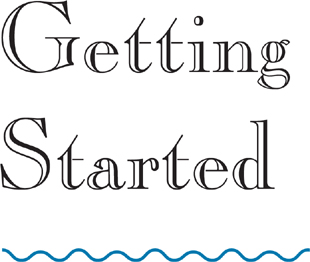


T here was once a young boy who was curious and bright; he had his own way of thinking about things and his own pace for caring about them. School didnt hold much relevance for him because he had other plans, and he was always busy learning. For instance, he collected medallions from every place he visited. Each day, he wore a different one to school around his neck.
One day his teacher said, Matthew, tomorrow we are going to conduct a science experiment with metals. I bet we could learn something interesting about one of your necklaces. He could hardly wait to tell his parents, and much of the evening was spent discussing which medallion to take to school the next day. Finally he picked one laced with silver, from a trip he had taken with his grandfather. In the morning he was in a hurry to get to school. Returning home that evening, he shared his new scientific knowledge with his parents: metals all transmit electricity differently, and the silver in his medallion made it highly conductive.
The boy is much older now, but he still remembers that day, and he remembers what he learned about electricity. He also remembers the feelings he hadof his personal passions being genuinely interesting to others, of helping others learn, of being seen. The teacher may not remember that particular lesson, but she remembers other times when she made a special connectionsometimes with a student, other times with a mentor, a parent, another educator, or someone elseand came away changed.
Everyone reading this book, no doubt, has had similar experienceswhen someone fired your imagination with new knowledge or touched a deep chord in you that opened doorways you didnt know existed. Why do experiences like these hold so much power? Perhaps its because they are part of our most common birthright as human beings: our entry into life as eager and natural learners. The drive to learn is as strong as the sexual drive, writes anthropologist Edward T. Hall. It begins earlier and lasts longer.
T he Drive to Learn: An Interview with Edward T. Hall, Santa Fe Lifestyle, (Spring 1988), pp. 1214.
Learning is at once deeply personal and inherently social; it connects us not just to knowledge in the abstract, but to each other. Why else would it matter so much when a teacher notices something special about a student? Throughout our lives, as we move from setting to setting, we encounter novelty and new challenges, small and large. If we are ready for them, living and learning become inseparable.


